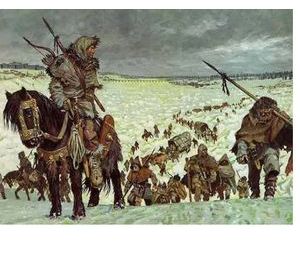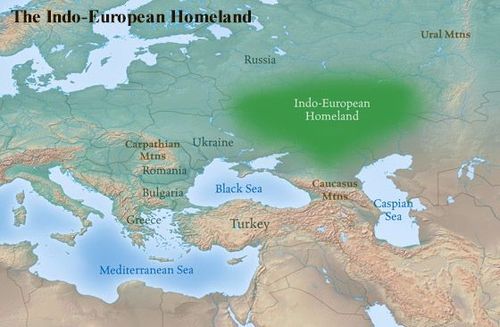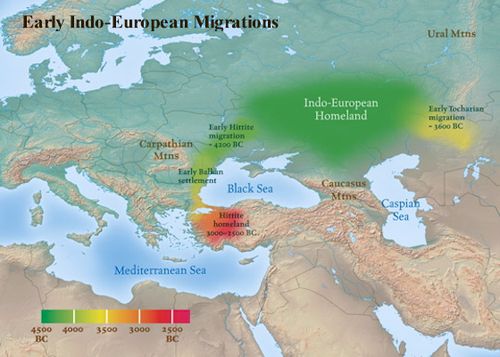 Oh, those feisty Indo-Europeans. Located some 4,000 years ago on the grassy steppes of Eurasia, just north of the Black and Caspian Seas, this ancient group of people gave us the English language—not just our language but nearly all of Europe's and India's, too.
Oh, those feisty Indo-Europeans. Located some 4,000 years ago on the grassy steppes of Eurasia, just north of the Black and Caspian Seas, this ancient group of people gave us the English language—not just our language but nearly all of Europe's and India's, too.
So how did the language of an isolated tribe of nomadic herders come to dominate so vast a territory? The answer is horses—and a human genetic mutation.
Map by Louis Henwood for The History of English Podcast
Horses were indigenous to the Eurasian grasslands, and the Indo-Europeans used them for meat—at first. But some bright (and brave) soul figured out that horses could be ridden and used for herding sheep and cattle. Once on horseback, the Indo-Europeans found they could raise and control larger and larger herds.
Another bright soul realized that instead of killing off so many goats or sheep for food, they could spare some and use their milk. Happily, that idea coincided with the spread of an errant gene—a mutation that produced lactase, the enzyme enabling humans to digest milk.
As a result, the herds thrived—as did the tribespeople, who grew in number and stature. The increase in herds and people gave way to the need for more land—and thus began the trek eastward to India and westward to Europe.
Map by Louis Henwood for The History of English Podcast
And if you were in their way? Well, they had horses—and you didn't—so you can guess who ended up with the land. Nonetheless, historians aren't sure how warrior-like the Indo-European tribes were, whether they always conquered or sometimes settled in peacefully. Most likely both.
However it happened, the Indo-Europeans came to dominate the inhabitants of their new lands. Their language continued to spread eastward and westward over thousands of years and thousands of miles, morphing into separate dialects...and eventually into separate languages, including the early Germanic languages, the ancestor of our own.
What this means, astonishingly, is that today about 50% of the world's population speak an Indo-European-derived language—3 billion of us—all from an ancient tribe of nomadic herders!
* This—and more, much more—is available on Kevin Stroud's wonderful podcast, The History of the English Podcast. Please take a week or two (or a month or two) to listen to his 50+ episodes. Stroud is a wonderfully lucid presenter and has put together a fascinating, detailed history of why our crazy language, English, is the way it is. If you love history and English, you'll be addicted. I am.
Also note the beautiful maps Stroud uses—two of which are included here. They were created for him by Louis Henwood. Thanks to both Kevin and Louis for their kind permission to use them.
